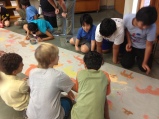Archive | October, 2013
AISC Celebrates UN Day
21 Oct
“This year again, we saw the United Nations come together on armed conflict, human rights, the environment and many other issues. We continue to show what collective action can do. We can do even more. In a world that is more connected, we must be more united. On United Nations Day, let us pledge to live up to our founding ideals and work together for peace, development and human rights. ” – Secretary-General Ban Ki-moon
To learn more about the United Nations (UN) and UN Day, see the new category I created on the right panel of the blog.
Ancient Mesopotamia
21 Oct
Last week, we introduced our second unit, Ancient Mesopotamia (Chapter 3). These two videos provide good reinforcement on what we have been learning in class and reading in our textbook. Check them out!
The Time You Have
18 Oct
This video will show you the importance of making the most out of your free time and your daily routine. In Advisory, we have worked on our Identity unit and you have recently tracked your time and how you spend each day. At the end of the video, the narrator asked, “What if you had just one more day. What would you do that day?” Some of you said this video clip, shared with the grade 6 team by Ms. Rebekah, was a bit sad (the man’s tone or voice I guess). What would your ideal or perfect day be like? How would you spend it?
Europe’s Oldest Natural Mummy Has Living Relatives
16 OctNEW STORY ABOUT OTZI: Last week, researchers announced that they have located at least 19 living descendants of a prehistoric iceman discovered along the Italy-Austria border in 1991. Known as Ötzi the Iceman, he is believed to have lived roughly 5,300 years ago before meeting a violent death. The news of Ötzi’s numerous living descendants is just the latest in a long series of discoveries scientists have made regarding the mummy. I think it’s pretty cool that we are still learning more about Otzi, after he was discovered over 20 years ago. Amazing!
Prehistoric Art
14 OctIn Chapter 2, we learned about Early Human Culture and the development of art. There are many examples of ancient cave paintings, particularly in France and Spain. Watch the video clip and also check out website for the Lascaux Cave Paintings in France (also mentioned in pages 6-7 in your textbook). Click ‘visit the cave’ to enter this cool website that features some really amazing early art. Women made most of the oldest-known cave art paintings, suggests a new analysis of ancient handprints. Most scholars had assumed these ancient artists were predominantly men, so the finding overturns decades of archaeological dogma.
Think about: Why do you think they painted in caves and what this art symbolize or mean to the people? How was cave art different from other kinds of art created by early humans? What does this art tell us about early humans? Respond to any of these questions.
Book Reviews!
9 OctStudents,
It’s time to share a book you are currently reading or have read this year in Grade 6 Humanities. Write a comment and tell us about your favorite book. Include the title and author, the genre (fantasy, realistic fiction, mystery, science fiction, etc.) and, of course, why you think it’s the best book. Sentence starter:
My favorite book I have read this year is ______________ (title) by ______________ (author). I love (or loved) this book because ……. (tell us why your book was so great). No SPOILERS, please.
Thanks, and we look forward to reading your comments. All students are expected to share a book they have read. It’s great when you can share AWESOME books with your classmates and teachers.
The First Communities
6 OctIn Chapter 2 (lesson 3), you will read on pages 70 – 71 about a famous 8,000 year old village in present-day Turkey named Catal Huyuk. Click on the link and read about the mysteries of Catal Huyuk, an example of a complex village. Look at some photos of what it looks like today and the archaeological work there. The website is cool and very student-friendly. Essential Question: How did life in a complex village compare with that in a simple village?
On Friday, October 11th you will have a test on Chapter 2, Lessons 1, 2, and 3. How can you study and prepare for this test?
-
Review the notes in the Moodle folder (Chapter 2)
-
Classzone – flipcard vocabulary review, online quiz, and other activities
-
Study the vocabulary, notes and review questions in your notebook
-
Re-read the lessons
-
Watch the video clips and review the links on the blog
Good luck!
What is a Memoir?
4 Oct
This week you learned what a memoir is, and you began to brainstorm ideas (best times, worst times, first times, last times) before narrowing your choice to one topic. Next week, you will continue working on your first draft, adding details and dialogue. Watch this short video for a quick review of a memoir.
What is Irrigation?
3 Oct








Recent Comments